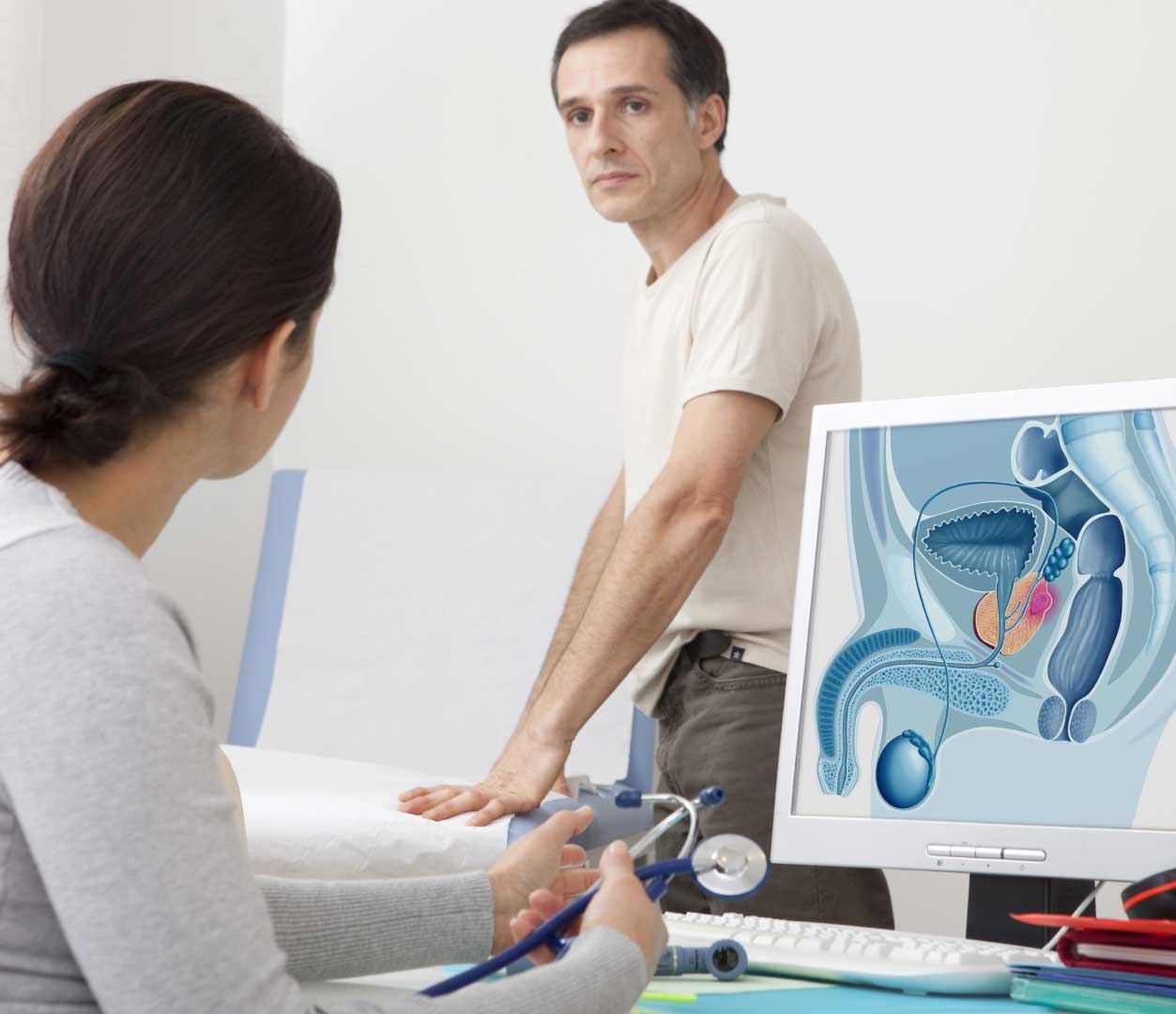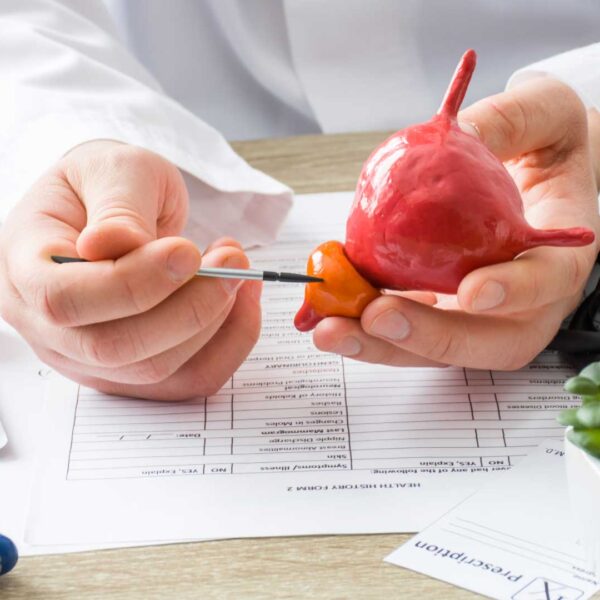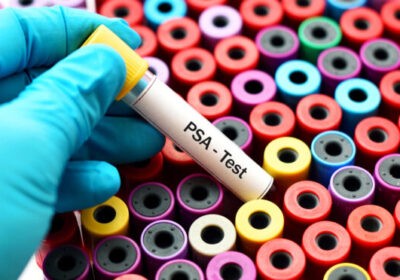Best Prostate Cancer Treatment
In Kolkata
Get Clinically Successful Advanced Treatments for Prostate Cancer From Experienced Doctors at Onco Cancer Centres, Kolkata
- Best-In-Class Services & Quality Treatments
- Same day Investigation + Treatment Initiation
- Dedicated, Advanced Oncology Facility
- Affordable Diagnostics
- Low-cost Advanced Treatment Options With Zero-cost EMI
REQUEST A CONSULTATION
Please fill in your details to help us connect you with Onco Cancer Care Smart Clinic


Rated 5/5 Reviews
What is Prostate Cancer?
Prostate cancer begins when cells in the prostate gland grow abnormally. Almost all prostate cancers are adenocarcinomas. Other rare types of prostate cancers include small cell carcinomas, neuroendocrine tumours, transitional cell carcinomas, and sarcomas. But all prostate cancers develop from the cells of the glands that produce seminal fluid. Prostate cancer usually affects men over the age of 50, and the risk of developing prostate cancer increases with age.
Our Team of Top Prostate Cancer Specialists in Kolkata

Dr. Rakesh Shankar Goud
MBBS, DNB-Radiation Oncology
Dr. Abid Ali Mirza
Surgical Oncologist
Dr. M A Suboor Shaheerose
Medical Oncologist
Dr. Amit Jotwani
CoFounder, CMO, Chief Oncologist
Dr. Shikhar Kumar
Consultant Medical Oncologist
Dr. Rakesh Shankar Goud
MBBS, DNB-Radiation Oncology
Dr. Abid Ali Mirza
Surgical Oncologist
Dr. M A Suboor Shaheerose
Medical Oncologist
Dr. Amit Jotwani
CoFounder, CMO, Chief Oncologist
Dr. Shikhar Kumar
Consultant Medical Oncologist
Dr. Rakesh Shankar Goud
MBBS, DNB-Radiation Oncology
Dr. Amit Jotwani
CoFounder,CMO,Chief Oncologist
MD (Radiotherapy), FHPRT, SBRT(Netherlands), AMPH

Dr. Shikhar Kumar
MD, DNB,DM – Medical oncology, ECMO
MD (Radiotherapy), FHPRT, SBRT(Netherlands), AMPH

Dr. Rakesh Shankar Goud
MBBS, DNB-Radiation Oncology
MD (Radiotherapy), FHPRT, SBRT(Netherlands), AMPH
Take Advantage of Our Onco Cancer Centres
- Multi-disciplinary care
- Hassle-free consultation
- Doctor consultation for more than 30 minutes
- No IP charges for chemotherapy
- Advanced technology like scalp cooling, leg massager at the center
- Tele-consultations available with oncologists around the country
- Second opinions offered free of cost
- Complementary diet plans
- Discharge process Less than 1 hour

Signs and Symptoms of Prostate Cancer

- Pain in the chest, hips, back, or bones
- Erectile dysfunction
- Presence of blood in urine or semen
- Difficulty urinating or interruption of urination
- Frequent urination, mainly at night
- Pain or burning during urination
- Discomfort or pain when sitting due to an enlarged prostate
- Fatigue
- Weakness or numbness, usually in the legs or feet
- Loss of control over bladder or bowel due to pressure from cancerous tumours on the spinal cord
Consult an oncologist and get examined
Diagnostic Tests for Prostate Cancer in Kolkata
Screening:
Digital rectal exam (DRE): In this test, your doctor inserts gloved fingers into the rectum and examines the size, shape, and consistency of the prostate gland.
Prostate-specific antigen (PSA) test: In this test, If PSA levels are higher than normal, this indicates that the prostate is infected or inflamed and cancer is suspected.
Diagnostic tests:
Transrectal ultrasound (TRUS) scan: This imaging test is performed by inserting a small ultrasound probe into the rectum to scan the prostate gland for any abnormal growth.

Magnetic Resonance Imaging (MRI): An MRI scan gives detailed images of your prostate, which helps with a procedure for obtaining prostate tissue samples for a biopsy.
Prostate biopsy: With the help of TRUS and MRI scans, it is necessary to collect a prostate tissue sample to check for cancer cells.
Imaging tests: Once prostate cancer is diagnosed, further imaging tests are done to determine how far it has spread. Scans may include an ultrasound, CT scan, MRI scan, bone scan, or PET scan. Not all tests are necessary, your doctor will recommend the right imaging test based on your condition.
Genetic testing: This test is done to determine if your prostate cancer is caused by any genetic mutations. But in certain cases, it is performed to take treatment decisions.
Get discount on Diagnostic tests
Advanced Procedures for Prostate Cancer Treatment in Kolkata
Surgery for Prostate Cancer: Surgery is the best option for stage I, II and III prostate cancer, where cancer is only in the prostate or locally advanced. Sometimes surgery is also recommended in combination with other treatments for advanced-stage prostate cancer. Radical prostatectomy is a common surgical procedure in which the prostate gland, nearby lymph nodes and surrounding healthy tissue are removed. Surgery can be performed by two techniques;
1. Robot-assisted Laparoscopic prostatectomy: In this method, several small incisions are made on the abdomen, and then surgical instruments are inserted through the incisions and surgery is performed.
2. Retropubic Surgery: In this method, one large incision is made in your lower abdomen and the prostate is removed along with the surrounding cancerous part.
If surgery is not possible, Doctor will recommend Ablation Therapies, Chemotherapy, Radiation therapy, Targeted therapy, Immunotherapy, Hormone Therapy to destroy the tumour.
Talk To Our Expert Oncologist
Cost Of Prostate Cancer Treatment In Kolkata
The cost of prostate cancer treatment may vary depending on hospital facilities, medical expertise, pre-treatment costs (consultations, blood tests, and scans), type of treatment you are receiving, and post-treatment costs (follow-up consultation for periodic checks including tests, scans, rehabilitation, and medications).
To know the cost details for your prostate cancer, you can call us at 9019923337 and we will give you an estimate.
On average, the cost of prostate cancer treatment in Kolkata ranges from INR 1,00,000 to INR 8,90,000.
Get Best Quote for Prostate Cancer Tretment In Kolkata
Clinical Experience & Patient Stories
We are always pleased to hear positive feedback about Onco Cancer Centres. Here are some of the testimonials we’ve received from our Patients
Frequently Asked Questions on Prostate Cancer Treatment In Kolkata
A Urologist is the best doctor to treat prostate cancer. A urologist is a specialist in treating diseases of the urinary tract and male reproductive system, including the prostate. Depending on your treatment regimen, related oncologists are also involved in treating prostate cancer.
Your doctor will choose the best treatment based on the type and severity of the cancer and your general health. Your doctor may perform a surgery called prostatectomy, where the prostate will be removed. Apart from surgery, your doctor may also give you radiation therapy and some other treatments to treat prostate cancer well and prevent it from recurring.
The definite causes of prostate cancer are unknown. But researchers have found some risk factors that might increase the chances of getting prostate cancer. Such factors include;
◉ A man’s age, because the risk of getting prostate cancer increases with age
◉ Prostate cancer is more commonly seen in black men than in white men. So the race of a person is also a factor but the reason behind this is unclear.
◉ Family history of prostate cancer
◉ Inherited or acquired genetic mutations
◉ High levels of calcium intake can increase the risk of prostate cancer
◉ Being overweight
◉ Lack of physical activity
◉ High levels of estrogen and testosterone
◉ Inflammation in the prostate gland (prostatitis)
◉ Smoking
◉ Underwent a vasectomy (minor surgery to prevent men from reproducing)
Prostate cancer doesn’t show any obvious symptoms. But there are some indications that you should consider as warning signs.
◉ Erectile dysfunction
◉ Blood in the urine or semen
◉ Frequent urge to urinate, especially at night
◉ Pain or burning during urination or ejaculation
◉ Difficulty stopping or starting urination
These signs may also be related to other problems. Talk to your doctor and get your prostate tested.
Considering the results of your imaging tests and diagnostic tests, your doctor will assign a stage to your prostate cancer. This stage indicates the size, location, spread, and severity of your prostate cancer. Prostate cancer can be staged into stages I to IV.
Stage I: Prostate cancer is in its early stages and grows slowly. Only half of the prostate or less than that is affected. At this stage, PSA levels are low, no tumours are present, and cancer cells look like normal cells.
Stage II: In this stage, PSA levels are low to moderate and the tumour is found only in the prostate. Stage II prostate cancer has the potential to spread to other organs.
Stage III: In this stage, PSA levels are high and tumours are found growing into nearby tissues. Stage III prostate cancer is locally advanced and this stage can be classified as high-grade, where cancer is likely to grow fastly and spread to nearby organs such as the bladder or rectum.
Stage IV: Cancer has spread beyond the prostate to the seminal vesicles, nearby tissues, nearby lymph nodes, and other body parts such as the rectum, bladder, or pelvic wall. Stage IV is the most advanced prostate cancer that can spread to distant lymph nodes and even bones.
Prostate cancer is also graded into high-grade, medium-grade, and low-grade using the Gleason score. Gleason’s scoring system is based on how much the cancer cells look like normal cells when viewed under a microscope. The grade denotes how aggressive your prostate cancer is. Higher grade prostate cancer indicates that your cancer is growing aggressively and is more likely to spread to distant parts of the body, while lower grade prostate cancer indicates that cancer cells are similar to normal cells and are less likely to spread.
Prostate Cancer is common in men over the age of 40, and the risk of developing prostate cancer continues to increase with age. Young men between the ages of 19 to 40 are rarely diagnosed with prostate cancer. According to recent statistics, 13 out of every 100 men are affected with prostate cancer in their lifetime
Prostate cancer can be effectively treated with both radiotherapy and surgery. Each treatment can cause side effects such as bladder or bowel incontinence, and erectile dysfunction. Discuss the treatment outcomes and side effects with your doctor and then make an informed decision. Both radiation therapy and surgery have been equally successful in treating prostate cancer. If you are fine with having your prostate removed, go for surgery.
Early-stage prostate cancers can be completely cured because the tumours are more likely to respond to treatment. But metastatic prostate cancer (spread beyond the prostate to other body parts), cannot be cured but can be treated to prolong life. Since prostate cancer grows slowly, almost 90% of prostate cancer cases are detected early. So we advise you to get your prostate screened if you have any risk factors or are experiencing any signs of prostate cancer.
Prostate surgery may increase the risk of complications, so it is not recommended for men over 70 years. In some cases, when the man is healthy enough, radical prostatectomy is considered a safer option.
If prostate cancer is in its early stages, it can be cured and that person can live for 5 years to 10 years. In the case of advanced prostate cancer, it cannot be cured but treated to increase the lifespan for a year or longer. The overall survival rates for prostate cancer survivors will be between one year to 10 years.
Many prostate cancers are diagnosed in stages I, II, and III, where it affects only the prostate or has spread locally or regionally. Prostate cancer treatments have high chances of curing prostate cancer at these stages, and men who are treated can live cancer-free. The treatment can also be beneficial for treating stage IV prostate cancer and prolonging life to some extent.
Prostate cancer surgery is usually done through a radical prostatectomy procedure. In this surgery, the surgeon removes the prostate gland, seminal vesicles, and pelvic lymph nodes. After this surgery, you can lead a normal life without any further treatments and without fear of cancer recurrence. But you may face side effects such as urinary incontinence (loss of control over your bladder) and erectile dysfunction (loss of sexual function). Men treated with this surgery can expect their survival of up to 10 years.
Hormone therapy, also called endocrine therapy, is an effective treatment for advanced prostate cancer. Cancer can grow rapidly with the help of the male hormone testosterone. So, hormone therapy is recommended to suppress testosterone production and block testosterone from reaching cancer cells. Sometimes, hormonal therapy is also given in combination with radiotherapy. If hormone therapy doesn’t work chemotherapy is the next treatment of choice.
Related Blogs

Six Myths Around Prostate Cancer Busted
World over, Prostate cancer has the highest incidence in men after lung cancer while in India it is one…

How Can I Reduce My Risk of Prostate Cancer?
A risk factor is anything that can increase the likelihood of developing a disease/condition….

Is Prostate Screening the Right Choice for You?
Dr Shikhar Kumar, Medical Oncologist, Onco Cancer Centres, explains who should get screened for…

Best Treatment Options for Prostate Cancer
Prostate cancer is the second most common cancer in men in the world. This cancer affects cells in…

Six Myths Around Prostate Cancer Busted
World over, Prostate cancer has the highest incidence in men after lung cancer while in India it is one…

How Can I Reduce My Risk of Prostate Cancer?
A risk factor is anything that can increase the likelihood of developing a disease/condition….

Is Prostate Screening the Right Choice for You?
Dr Shikhar Kumar, Medical Oncologist, Onco Cancer Centres, explains who should get screened for…

Best Treatment Options for Prostate Cancer
Prostate cancer is the second most common cancer in men in the world. This cancer affects cells in…

Six Myths Around Prostate Cancer Busted
World over, Prostate cancer has the highest incidence in men after lung cancer while in India it is one…

How Can I Reduce My Risk of Prostate Cancer?
A risk factor is anything that can increase the likelihood of developing a disease/condition….

Is Prostate Screening the Right Choice for You?
Dr Shikhar Kumar, Medical Oncologist, Onco Cancer Centres, explains who should get screened for…

